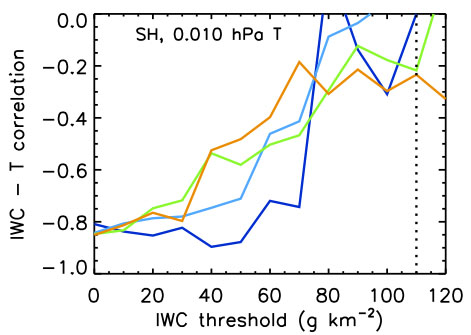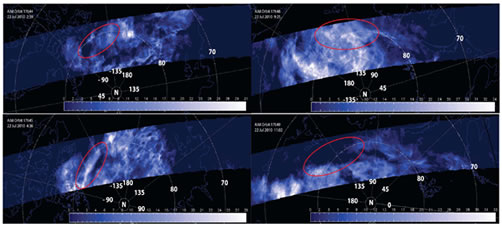|
STATUS:
10.24.2012
Spacecraft Status
The AIM spacecraft performed nominally over this period. CIPS transitioned to Southern Hemisphere imaging on September 23rd. Then on October 19th the onboard Orbit Calculator, which provides the spacecraft with current state vectors, was updated in order to mitigate for orbit degradation.
Instrument Status
SOFIE: A paper describing hemispheric differences in PMCs and their environment was recently accepted by JASTP (LPMR special issue). This work concluded that hemispheric PMC differences are attributed to colder temperatures in the north, since water vapor is similar in both hemispheres. The reference is given below.
Hervig, M. E., D. E. Siskind, M. H. Stevens, and L. E. Deaver, Inter-hemispheric comparison of PMCs and their environment from SOFIE observations, J. Atmos. Solar-Terr. Phys., in press, 2012.
An investigation concerning the sensitivity of PMCs to their environment is underway. This study is quantifying the dependence of PMC mass density on temperature and water vapor as a function of altitude and day of year. In addition, the PMC detection threshold is being investigated, with reference to other instruments such as SBUV which are ~100 time less sensitive than SOFIE. The results indicate that both temperature and water vapor, in particular at altitudes just below the clouds, are good predictors of PMCs. This good correlation is reduced for the case of only bright clouds (see figure below), however, as in the SBUV case. The observations are corroborated by model results.
SOFIE meteoric smoke retrievals were updated and the results are being analyzed. The analysis of smoke composition using these new results is consistent with the smoke composition derived from analysis of the smoke contained in PMC particles. Smoke versus time for the entire mission is being analyzed and the results indicate that the strength of the seasonal cycle varies from year to year. These results are being compared to the strength of the atmospheric circulation and also the PMC characteristics to look for new connections.
A new data product was developed and released to the public (via ftp or SOFIE webpage), known as Level 2 mission files. These files contain one retrieval (e.g., temperature) for the entire mission.

CIPS: The CIPS instrument continues to perform well, with no health issues. A recent investigation by Chandran et al. [2012] analyzed CIPS images in conjunction with a 2D microphysical model, the Community Aerosol and Radiation Model for Atmospheres (CARMA 2D) to study the effects of atmospheric gravity waves (AGWs) on PMCs. The authors found that the variation in observed PMC brightness from orbit-to-orbit is in part due to the upward transport of water vapor by AGWs. In addition, AGWs cause ice particles to grow from sub visual to visual, leading to orbit-to-orbit changes in the observations.

Figure Caption. Two sets of consecutive orbit strips from CIPS images from 22 July 2010. The images were taken at 2:59 UT (top left), 4:36 UT (bottom left), 9:25 UT (top right) and 11:02 UT (bottom right). The red ovals in the left column indicate areas of PMC growth, and the red areas in the right column indicate areas of PMC sublimation.
Reference:
Chandran, A., D. W. Rusch, G. E. Thomas, S. E. Palo, G. Baumgarten, E. J. Jensen, and A. W. Merkel (2012), Atmospheric gravity wave effects on polar mesospheric clouds: A comparison of numerical simulations from CARMA 2D with AIM observations, J. Geophys. Res., 117, D20104, doi:10.1029/2012JD017794.
|
